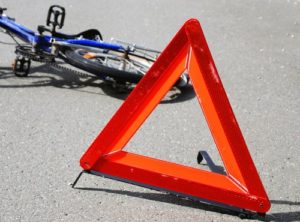
Missouri Code § 307.188 says that “[e]very person riding a bicycle or motorized bicycle upon a street or highway shall be granted all of the rights and shall be subject to all of the duties applicable to the driver of a vehicle.” But automobile drivers do not always recognize that right to the road, and sometimes, their inattentiveness can lead to accidents. Complicating matters further, as the American Safety Council points out, “Good road design allows autos and bicyclists to cooperate with little friction. But many of our Missouri roads are not the best.”
There are laws in place to protect bicyclists, and when both cyclists and motorists follow them, many accidents can be avoided. But when a motorist strikes a bicycle, the bicycle—and, quite likely, the bicyclist—is at a potentially dangerous disadvantage.
If you have been injured or a loved one was killed in a bicycle accident and you want to pursue justice, contact a St. Louis bicycle accident lawyer for help. At Ben Crump Law, PLLC we will evaluate your accident for free, and we never shy away from tough cases. Since our attorneys work on contingency, you will not pay us anything until we recover compensation on your behalf.
To schedule your free consultation, call our offices today at (800) 761-5225.
Rules of the Road
Missouri statutes contain a number of regulations bicyclists must follow. These include:
- § 300.347: Do not ride on a sidewalk in a business district; if you are riding on a sidewalk, yield to pedestrians.
- § 304.285: Stop at red lights; after coming to a full stop, bicyclists are allowed to proceed if “the traffic control signal continues to show red for an unreasonable time,” it is “apparently malfunctioning,” or it was “programmed or engineered to change to a green light only after detecting the approach of a motor vehicle.”
- § 307.183: Bicycles must have brakes that allow them to stop within 25 feet at a speed of 10 mph.
- § 307.185: At night, bicycles must have a front-facing lamp and a rear-facing reflector, and bicyclists or their bicycles must have lights or reflective material on each side.
- § 307.190: Bicyclists riding at speeds below the speed limit or the flow of traffic shall ride “as near to the right side of the roadway as safe, exercising due care when passing a standing vehicle or one proceeding in the same direction.”
- § 307.191: Shoulder riding is allowed but not required.
- According to the Missouri State Highway Patrol, helmets are not required, but between 70% and 80% of bicycle fatalities involve head injuries, so they are a good idea.
The law also lays out a few requirements for how drivers should interact with bicyclists. These include:
- § 300.330: Only drive in a designated bicycle lane “for the purpose of a lawful maneuver to cross the lane or to provide for safe travel,” and yield to any bicycles that are there.
- § 300.411 and § 304.678: Maintain a safe distance when passing a motorcycle.
For a free legal consultation with a bicycle accidents lawyer serving St. Louis, call (800) 761-5225
What to Do After a St. Louis Bicycle Accident
In many cases, accidents between bicyclists and cars occur when the driver is distracted, not paying attention, or intoxicated. Only rarely are these collisions the bicyclist’s fault, though there is no guarantee the driver’s insurance company will see it that way.
As with any traffic accident, § 300.110 requires you to immediately contact the authorities and wait at the scene until an officer arrives. If you are physically able, document as much as you can: Take pictures of the damage to your bicycle and the other vehicles involved. Speak to anyone who witnessed the accident and record their names. Exchange information with the driver. If you are injured, this may not be possible, and your first priority should be ensuring your safety until emergency services arrive.
As soon as possible, you may wish to contact a St. Louis bicycle accident lawyer to make sure your rights are protected.
St. Louis Bicycle Accident Lawyer Near Me (800) 761-5225
Accident Liability
Liability in a Missouri bicycle accident case works the same way it does in other traffic accidents: The negligent party must pay for the damages to the other person and their property, including lost wages and medical expenses. The state requires all motorists to carry liability insurance.
The minimum amount of coverage each vehicle must carry, according to the Department of Revenue (DOR), is as follows:
- $25,000 per person for bodily injury liability (BIL)
- $50,000 per accident for BIL
- $10,000 per accident for property damage liability (PDL)
Comparative Negligence
The party at fault must cover the other person’s damages in Missouri, but there is a wrinkle: The state uses a standard called “comparative negligence.” With comparative negligence, the amount of your potential compensation can be reduced in proportion to the degree of fault you are assigned for the accident, according to the DOR. If a motorist can successfully argue that a bicyclist was 10% responsible for the accident, the bicyclist’s compensation may be reduced by 10%.
The motorist’s insurance company will make an initial determination about fault after its investigation of the accident. But you do not have to accept whatever they say. If you do not believe their offer is sufficient, you may file a lawsuit.
Compensation and Statute of Limitations
Missouri law does not limit how much a person can recoup in either economic or noneconomic damages following a personal injury case. § 516.120 allows within five years from the date of the accident to file a lawsuit.
Click to contact our St. Louis Personal Injury Lawyers today
How We Can Help
At Ben Crump Law, PLLC we know that bicycle accidents can have lasting effects upon both the victim and their family. We are committed to pursuing justice on our clients’ behalf and fighting to get the compensation they deserve. If you would like to learn more about how a St. Louis bicycle accident lawyer can help protect your rights, call our offices today at (800) 761-5225.
Call or text (800) 761-5225 or complete a Free Case Evaluation form








